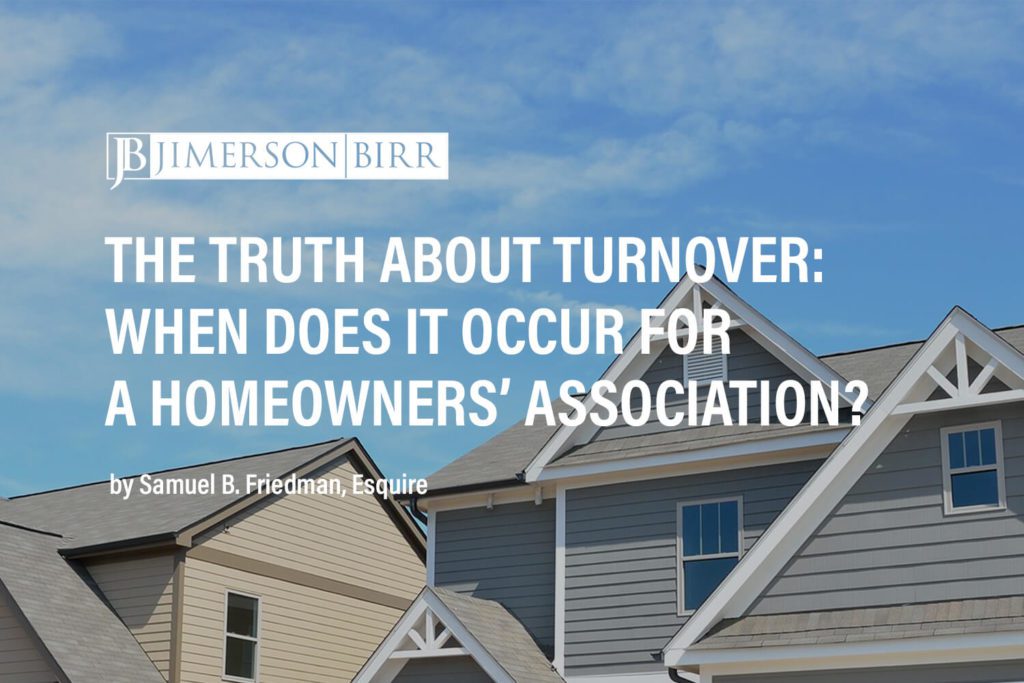Turnover is a vaunted date on the calendar for every homeowners’ association. Knowing at what time turnover occurs is necessary for a homeowners’ association to properly plan and effectuate the transition of board control from the developer to the owners.
Turnover is simply defined as “the transfer of association control from developers to non-developer owners. [1]” What this means practically is that the members of the community association other than the developer are entitled to elect at least a majority of the members of the board of directors. The Florida Homeowners Association Act and the Florida Condominium Act have differing deadlines for when turnover within a community association occurs. This blog reviews the turnover dates for homeowners’ associations only.
Chapter 720, Florida Statutes governs Florida homeowners’ associations. Specifically, Section 720.307(1), Florida Statutes governs when turnover occurs for homeowners’ associations. The statute provides that members other than the developer are entitled to elect at least a majority of the members of the board of directors of the homeowners’ association when the earlier of the following events occurs:
- Three (3) months after 90% of the parcels in all phases of the community that will ultimately be operated by the homeowners’ association have been conveyed to members;
Unlike condominium associations, there is no hard deadline as to when turnover must occur. The latest time at which turnover can occur is three months after 90% of the parcels in all phases of the community have been conveyed. For example, if the developer planned a 100-home community, and it takes the developer ten years to convey 90 of those homes, three months after that 90th home’s closing date is when turnover must occur. Therefore, the board of directors’ pre-turnover should keep track of when this date is close to occurring so that it can adequately prepare to transition the board.
- Such other percentage of the parcels has been conveyed to members, or such other date or event has occurred, as is set forth in the governing documents;
The governing documents can state at what point turnover occurs. The developer, who drafts the governing documents of the community can expressly provide this date. It is not required that the developer incorporate a turnover date into the governing documents. Therefore, a community association should review its governing documents and be aware of when the developer states turnover will occur if the developer chose to place such a provision in the community association’s governing documents.
- Upon the developer abandon or deserting its responsibility to maintain and complete the amenities or infrastructure as disclosed in the governing documents;
With respect to abandonment, Section 720.303(1)(c), Florida Statutes provides a rebuttable presumption that the developer has abandoned and deserted the property if the developer has unpaid assessments or guaranteed amounts under Section 720.308, Florida Statutes for a period more than two years.
- Upon the developer filing a petition seeking protection under Chapter 7 of the Federal Bankruptcy Code;
- Upon the developer losing title to the property through a foreclosure action or the transfer of a deed in lieu of foreclosure, unless the successor owner has accepted an assignment of developer rights and responsibilities first arising after the date of such assignment; or
- Upon a receiver for the developer being appointed by the circuit court and not being discharged within thirty days after such appointment, unless the court determines within thirty (30) days after such appointment that transfer of control would be detrimental to the association or its members. [2]
Subsections (c)-(f) are variable upon a developer’s financial hardship. Although the triggering events in (c)-(f) are hard to predict, if it looks like the developer is going south, it is extremely important the owner-board members in the developer-controlled association to prepare its affairs just in case.
It is a false myth that once turnover occurs, the developer is gone for good. In fact, this is not the case. So long as at least five percent (5%) of the parcels in the community are held for sale by the developer in the ordinary course of business, the developer is entitled to elect at least one member of the owner-controlled board of the homeowners’ association.[3] Similarly, the owners are entitled to elect at least one member of the board of directors of the homeowners’ association if 50% of the parcels in all phases of the community have been conveyed by the developer.
In conclusion, when turnover occurs may vary based on a wide variety of factors. The association should be cognizant of when any of these triggering events are approaching to prepare for control of the board as well as start to request and obtain the documents from the developer [4] integral to a smooth transition.
[1] F.A.C., 61B-22.001(6).
[2] Fla. Stat. § 720.307(1)(a)-(f).
[3] Fla. Stat. § 720.307(3).
[4] A list of the documents the developer must provide to the association ninety (90) days after turnover is outlined in 720.307(4).

